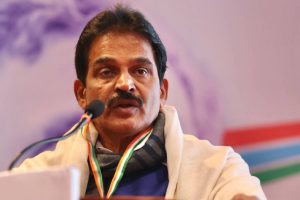Disha Malhotra is one of the few women in the Indian football scene today. She is the first Football Association-licensed woman coach in the country and was selected as one of the “20 Emerging Women Leaders in India” by The New York Times.
New Delhi-based Malhotra has a Bachelor’s degree in sport management from the University of Michigan and has played in Italy and the US apart from representing India at the under- 19 level. Along with being one of the most supportive and understanding coaches, she is also one who pushes players hard to achieve their potential.
Excerpts from an interview:
Q What made you fall in love with the sport?
I started playing football in Class VIII. There was no particular moment; it was rather over a period of time. I loved playing the sport and there was no limit to the number of hours I could play it. I wanted to improve and hence started putting in massive hours. An hour in the morning before school started, one and a half hours after school and then another hour in the evening. I wanted to be the best so I kept persevering. The passion kept growing. Little things like the taste of water after a hard practice session, lying down on the field after a tough game, winning or scoring a goal were the most amazing things, which kept me attached to the game and told me that this was my true calling.
Q Tell us about your journey from school and how you decided to pursue sport management and ultimately become a coach.
I got a lot better and played for the Delhi state team, eventually representing the Indian national team in Class XII. While playing for India against teams like Australia, I realised that I needed a proper professional setup to become an elite player. Thus, I decided to go to Italy to play for a Serie A2 women’s club and also train in an Italian Academy. After that, I also wanted to get my education in the sports industry, as I wanted to acquire the expertise for the administrative side of the profession. Classes in sport economics, sport finance, sport economic policy, sport psychology, sport sponsorship et al widened my thoughts. Playing careers are different than many others because they end at a much younger age compared to standard retirement age and often unexpectedly, too. I would have definitely had a longer playing career if not for the injuries I suffered, which eventually got chronic. That said, I always wanted to become a coach but not this soon. The transition took some time as it is hard to let go and move on from a playing career at such a young age. For the first year and even after that, I was sceptical about my decision. But now I can finally say that I am glad to have made that decision.
Q What challenges did you face on your journey to becoming the first FA licensed female coach in India?
The FA license is definitely challenging and I had to constantly work towards my development as a coach practically and theoretically. I wish I had a mentor coach in India who I could take guidance from, as due to the distance it was difficult to communicate. I don’t think it is hard to get the license but one has to put in a lot of hours on and off the field to attain it. From preparing the session to its desired execution, and later evaluation — it is a time-consuming job. So I had to be consistent with it and even when I was in India, I was pretty much working every day towards my license. The process took place over a period of five months in which I had to travel thrice to London for preparation and exams.
Q What are the major misconceptions regarding women’s football in India?
Among others, one which I would like to point out is the myth “Women’s football will never be as good as men’s football” and I think this stands true across the world. Many believe women can’t run as fast or kick the ball as hard as their male counterparts. However, I beg to differ. Just like there are weight categories in some sports but they still have equal demands, women’s football can also get at par with men’s football. Further, women haven’t played football as much as men. Not only does the men’s game have huge amounts of sponsorship and media attention, boys grow up playing football in school and dream of becoming multi-millionaire stars (not in India of course). In contrast, girls don’t have that financial incentive and only recently has it even become acceptable to play the sport.
Q What are you doing to promote football and specifically, women’s football?
I have started an organisation called Foot and Ball, which provides the youth of New Delhi-NCR with international standard and age-appropriate football training by quality and licensed coaches alongside technical support from Bruno Redolfi (Italian Soccer Schools AIC) with a long-term player development approach. We are currently running our football coaching centre at Tricky Taka, Vasant Kunj, for children from three to 12 years of age at the unique third generation artificial grass turf facility with floodlights. We are also running two centres in Gurgaon, coaching kids from four to 12 years of age as we strive towards forming a Park Place football team. FAB is managing the Ashoka University (Sonipat) men and women football teams. We also work on empowering the women football community with over 500 members in and around the National Capital Region. FAB organised a Women Football Tournament in 2014 (at Thyagaraj Stadium) with over 150 female players from various backgrounds with several stars (Gustavo Santos, Bruno Arias, Hans Mulder and more) from the ISL team Delhi Dynamos gracing the occasion. In August we will be organising a “Women’s Right and Football Festival” in Goa with the goal of addressing discrimination and the fight for empowerment and gender equality. We hope to bring together women from different backgrounds and provide them with a platform to share experiences, widen their array of thoughts and grow to become even stronger individuals.
Q Even today,after having achieved as much as you have, do you face discrimination because you are a woman in a male-dominated field?
Being a female coach is definitely challenging! Stereotypically, the masses are inclined towards thinking that a male coach is better than a female coach, regardless of their experience or qualification. That’s typical patriarchy. Also, the pay tends to be unequal. More than that is the absurd notion, “How can a female coach, coach a men’s team”. Personally, I feel the best way to face such situations is working with what you have and alongside people who respect your work. I have been lucky to get an opportunity to coach the Ashoka University men and women teams along with younger boys and girls, who have always appreciated my skills, methodology and expertise as a coach. I am confident that the efforts of female coaches like me will change the mindset of society, sooner than later.
Q What advice would you give to a school or college level footballer?
I think if they are passionate about football they should definitely try to pursue it as a career. They should explore the option of going abroad and playing for a university while completing their education. Then they should try to go professional. They can always play for India while doing that. But it is vital for them to focus on the quality of coaching they are receiving on a regular basis. In India, girls, or even boys for that matter, need a lot of match practice, which unfortunately is difficult to get due to unstructured play.
Q What do you have to say about the lack of facilities and the state of sports in India?
Yes of course the facilities can be a lot better but I don’t think that is the reason behind the unpopularity of the sport in our nation. If you look at Brazil they do not have the facilities, especially at the local club level. However, what they have is a football culture. The state of sports is definitely poor in India and enough importance is not given to it either in school or at higher levels. With regards to women’s football, things are worse as even at a senior level, you see leagues happen once in two years at times; that too for just two weeks. Other local tournaments and leagues are there but there is no official season. There is no structure or system in place for player development. The professional league for women has just started. I hope it will be able to aid women football development in India.
Q Why do you think the Indian women’s team has a higher Fifa ranking than the Indian men’s team?
I think the level of competition in men is more than in women, and of course, even the number of teams is more in men. Women football is relatively newer and many countries are still on the path of developing the same.
Q You have played in India, the US and Italy. Would you say the quality of players abroad is much more advanced than in India?
Yes, definitely the players abroad are far more advanced, which primarily originates from the fact that they start playing football when they are young; they have structured and competitive play from the beginning; better quality coaching, more game time, support from family, school, more facilities and opportunities, and a football culture.
Q What are your plans?
We all want India to feature in the World Cup in the near future but that is not going to happen overnight. A lot of effort needs to be put into grassroots education because the seeds we sow today will naturally yield fruits with proper nurturing. By integrating my experience from Italy, the UK and the US, I look forward to introducing the youth of India to an international standard of coaching and age-appropriate training methodology. It is imperative for kids to be exposed to workshops on nutrition, sports psychology and video analysis. I also wish to prepare players to avail the sports quota, scholarships and admissions within India as well as abroad. I hope to get an opportunity to coach the Indian national team someday soon as well.










